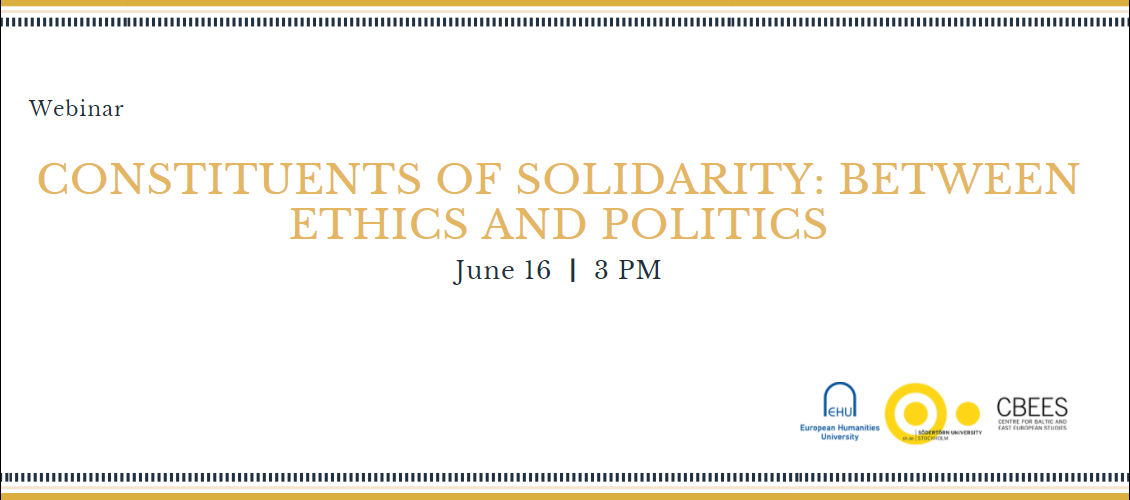Currently, a rapid rise of various protest movements that have become sites for innovative reconfigurations of the social-political field, for new identification processes, and new practices and manifestations of solidarity can be observed worldwide. The massive nonviolent protests in Belarus, as well as local protest actions in Russia in 2020-2021, are recent examples, and it is their variegated nature that makes us search for an understanding of today’s social-political life. What motivates people to take to the streets? Can we find coherence in their social and political demands, and if not, what kind of solidarity can we find in these actions? This webinar’s concern is to carry out a multidisciplinary analysis of the phenomenon of solidarity and clarify how it inspires collective endeavor in different social-political contexts.
A common aim is usually held as a prerequisite for the successful development of social movements as well as for the fruitful activity of political parties. Articulating political communality, in the form of a common aim or a communal collective identity, has come to appear highly problematic, and especially so in the post-socialist world. Yet, in actions and expressions of solidarity, we seem to find a form of communality, which is not necessarily bound to a distinct common identity but rather to a shared experience. How can we then understand this other communality in solidarity?
In order to pursue this question, the webinar suggests looking at the phenomenon of solidarity from the perspective of its genesis. Organizers invite presenters to inquire into various constitutive elements of solidarity as a shared experience that presupposes a characteristic intersection of personal awareness and collective intentionality. In other words, the solidarity will be approached in ‘statu nascendi’, so to say and the cases and practices that allow for explicating how ethics precedes and informs political articulation of solidarity will be addressed. At issue will be moral emotions and structural displacements that enable the emergence of solidarity as a phenomenon that can involve ethics as well as politics. Furthermore, a link between how (due to what constituents) solidarity became possible and how it manifested itself in every particular case will be discussed.
Speakers of the webinar and the topics:
- Tatiana Shchyttsova (EHU): “The ‘Solidarity of the Shaken’: Ethical Asymmetry and Political Sublime in the Belarusian Protest Movement”;
- Tora Lane (CBEES, Södertörn University): “Solidarity After, Before or Other to Politics? Some Reflections on the Post-Soviet Condition”;
- Per-Anders Rudling (Lund University): “The emerging of Belarusian Civic Society. Nationalism, Identity, and History in a Borderland”;
- Eva Schwarz (Center for Studies in Practical Knowledge, Södertörn University): “We Have Not Known Each Other Until This Summer. The Friendship Between Solidarity and Totalitarianism”;
- David Payne (Södertörn University): “After Antagonism, Discontent and Grievance Comes…?”
Program of the event:
- 3 PM – 3.10 PM: Welcome (Tora Lane)
- 3.10 PM – 3.40 PM: Tatiana Shchyttsova (Tora Lane)
- 3.40 PM – 4.10 PM: Per-Anders Rudling (Tatiana Shchyttsova)
- 4.10 PM – 4.25 PM: Break
- 4.25 PM – 4.55 PM: Tora Lane (Eva Schwarz)
- 5.00 PM – 5.30 PM: Eva Schwarz (Tatiana Shchyttsova)
- 5.30 PM – 6 PM: David Payne (Eva Schwarz)
- 6 PM – 6.30 PM: General Discussion (Eva Schwarz)
NB! To take part in the event, please, click this link.
The collaborating partners conducting this webinar are: Center for Research of Intersubjectivity and Interpersonal Communication (European Humanities University), Center for Baltic and East European Studies (Södertörn University) and Center for Studies in Practical Knowledge (Södertörn University).
